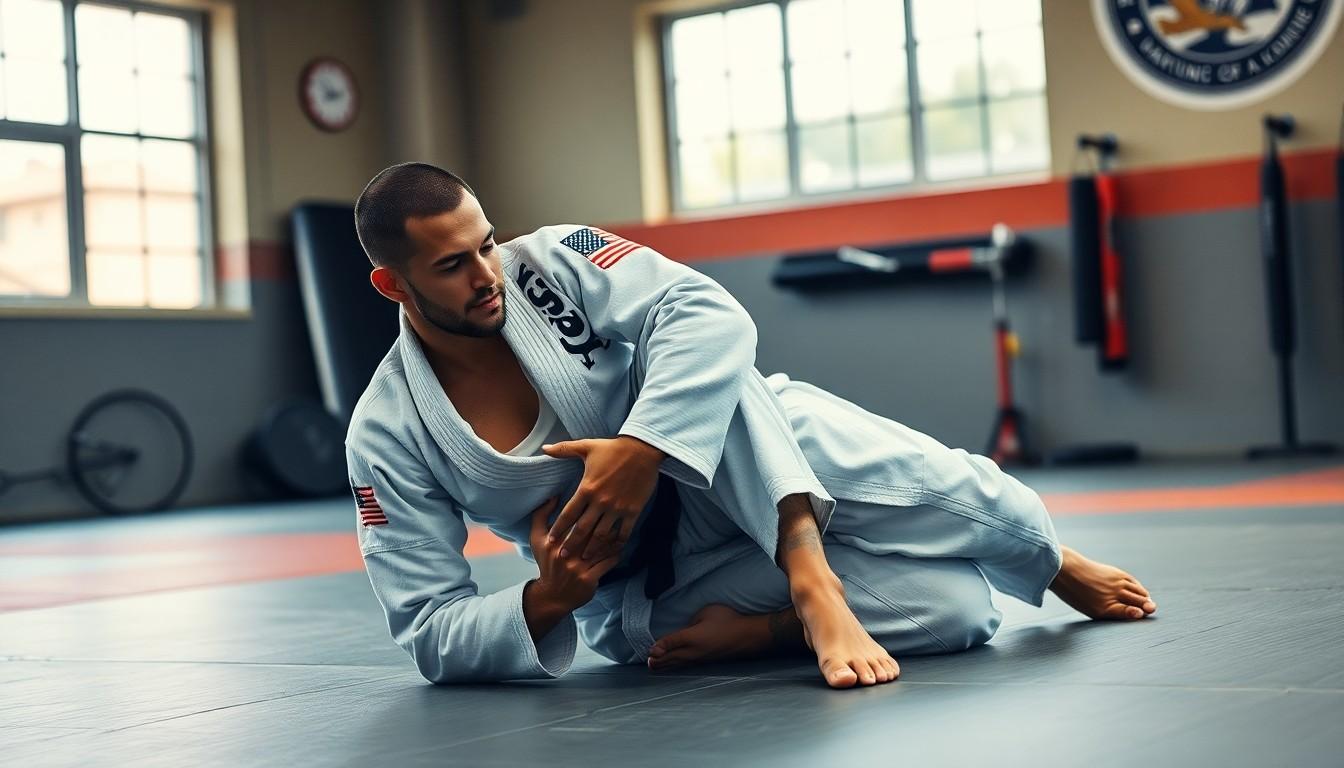Key Takeaways
- Jiu Jitsu Overview: Jiu jitsu is a grappling-based martial art that emphasizes technique and strategy, stemming from its roots in traditional Japanese jujutsu and Brazilian jiu jitsu.
- Current Olympic Status: As of now, jiu jitsu lacks official recognition from the International Olympic Committee (IOC), which requires specific criteria such as global participation and a recognized governing body for Olympic inclusion.
- Global Participation: The sport has gained popularity with practitioners in over 150 countries, reflecting its potential for diverse participation—an essential factor for Olympic recognition.
- Comparative Analysis: Unlike judo and taekwondo, which are established Olympic sports, jiu jitsu struggles with official support and standardization, affecting its legitimacy as an Olympic contender.
- Challenges Ahead: Logistical hurdles and issues with standardization, such as inconsistent rules across regions, pose significant challenges for jiu jitsu aiming for Olympic status.
- Future Prospects: Increased visibility, support from organizations, and collaboration among governing bodies could enhance jiu jitsu’s chances of becoming an Olympic sport in the future.
Jiu jitsu has gained immense popularity worldwide, captivating martial arts enthusiasts and athletes alike. As the sport evolves, many fans wonder whether it will earn a coveted spot in the Olympic Games. With its roots in Brazilian jiu jitsu and a strong emphasis on technique and strategy, the question of its Olympic status sparks lively discussions among practitioners and spectators.
While jiu jitsu showcases incredible skill and athleticism, the journey to becoming an Olympic sport is complex. Various factors come into play, including governance, global participation, and the International Olympic Committee’s criteria. Exploring these elements reveals the challenges and potential pathways for jiu jitsu to join the ranks of recognized Olympic disciplines.
Is Jiu Jitsu An Olympic Sport
Jiu jitsu, a martial art focused on grappling and ground fighting, showcases a unique combination of skill, technique, and strategy. Its growing popularity has led to increased interest in its potential recognition as an Olympic sport.
History and Origins
Jiu jitsu traces its roots back to traditional Japanese jujutsu, developed during the samurai era in Japan for unarmed combat techniques. In the early 20th century, Mitsuo Maeda introduced the art to Brazil, where it underwent significant transformation. Brazilian jiu jitsu, which emphasizes leverage and technique over brute strength, emerged from this cultural exchange, leading to the development of modern jiu jitsu practices.
Evolution of Jiu Jitsu
Jiu jitsu has evolved significantly since its inception. From the original techniques adapted by Maeda, practitioners like Carlos and Helio Gracie refined and popularized the martial art. Competitions began to surface, emphasizing skill and sportsmanship. Today, jiu jitsu features various rule sets and formats, including gi and no-gi competitions, expanding its reach and appeal globally. Various organizations, such as the International Brazilian Jiu Jitsu Federation, now govern competitions and promote the sport, further advancing its evolution within the martial arts community.
Current Status in the Olympics

Jiu jitsu’s pathway to Olympic recognition remains a topic of interest as it continues to grow in popularity. The sport’s official status with the International Olympic Committee (IOC) and its comparison to other martial arts provide insight into its potential future.
Official Recognition by the IOC
Jiu jitsu does not hold official recognition by the IOC at present. The IOC demands specific criteria for a sport to achieve Olympic status, such as global participation, a governing body, and a defined competition format. Although the International Brazilian Jiu Jitsu Federation represents the sport internationally, it lacks the recognition necessary for Olympic inclusion. Jiu jitsu promotion at various international competitions bolsters its case, yet it still faces challenges in meeting the IOC’s stringent requirements.
Comparison with Other Martial Arts
Comparing jiu jitsu to other martial arts highlights its unique position. Sports such as judo and taekwondo enjoy Olympic status due to substantial global participation and established governing bodies. These sports underwent extensive development, showcasing judo and taekwondo as competitive and popular disciplines. While jiu jitsu shares similar foundational elements with these martial arts, its lack of official recognition hinders its inclusion in the Olympic arena. Increased visibility and support from practitioners and organizations could pave the way for future opportunities in this competitive landscape.
Arguments For Jiu Jitsu as an Olympic Sport
Jiu jitsu’s potential as an Olympic sport hinges on several compelling arguments. These include promoting global participation and enhancing athletic standards.
Promoting Global Participation
Jiu jitsu has expanded significantly worldwide, with practitioners in over 150 countries. Its global reach creates opportunities for diverse participation among athletes. Events like the IBJJF World Championship attract competitors from multiple nations, showcasing an international platform. Furthermore, organizations such as the International Brazilian Jiu Jitsu Federation actively promote tournaments, fostering interest and engagement across continents. Increased participation illustrates jiu jitsu’s viability as a sport that resonates with various cultures, a key criterion for Olympic inclusion.
Enhancing Athletic Standards
Jiu jitsu competitions uphold rigorous standards, emphasizing skill, discipline, and strategy. Established rule sets promote fairness and safety, ensuring that athletes demonstrate high performance levels. The sport’s distinct weight classes allow for equitable competition, minimizing physical disparity among participants. Additionally, rigorous training regimens adopted by practitioners enhance their physical and mental preparedness. As the sport continues to evolve, adopting advanced training methods and techniques enhances overall athlete performance, further aligning jiu jitsu with Olympic ideals of excellence in sports.
Arguments Against Jiu Jitsu as an Olympic Sport
Several arguments exist against jiu jitsu achieving Olympic sport status, primarily focusing on logistical challenges and issues with standardization.
Logistical Challenges
Jiu jitsu faces significant logistical challenges hindering its Olympic inclusion. Various rule sets govern competitions, leading to inconsistencies across regions and organizations. Event organization requires substantial resources, including venue selection, equipment, and officiating. Furthermore, the expansive nature of the sport complicates participation, as scheduling conflicts among global competitions can reduce athlete availability for Olympic events. Solutions for these challenges demand comprehensive planning and collaboration among governing bodies to create a cohesive framework.
Issues with Standardization
Issues regarding standardization heavily impact jiu jitsu’s Olympic aspirations. Disparate styles and techniques emerge from diverse regional practices, leading to a lack of uniformity in rules and scoring systems. Without a universally accepted system, athletes might face confusion when transitioning between different competitive environments. Efforts to establish a singular governing body would address standardization, yet achieving consensus among existing organizations presents a considerable obstacle. This fragmentation undermines jiu jitsu’s ability to present itself as a cohesive sport on the Olympic stage.
Jiu Jitsu’s Journey Toward Olympic Recognition
Jiu jitsu’s journey toward Olympic recognition is both promising and challenging. The sport’s rich history and growing global presence highlight its potential appeal to the Olympic community. With practitioners spanning over 150 countries and established competitions, jiu jitsu demonstrates the qualities that align with Olympic ideals.
However, significant hurdles remain. Logistical challenges and the need for standardization are critical issues that must be addressed for jiu jitsu to meet the criteria set by the International Olympic Committee. As the sport continues to evolve, collaboration among organizations and practitioners could strengthen its case for inclusion. The future of jiu jitsu in the Olympics hinges on these efforts, showcasing its unique blend of skill and strategy on an international stage.
